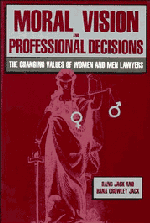Book contents
- Frontmatter
- Contents
- Preface
- Acknowledgments
- 1 Care and rights: two ways of perceiving the world
- 2 The lawyer's role: partisanship, neutrality, and moral distance
- 3 Personal morality: the orientation of lawyers toward rights and care
- 4 Personal morality and attorney role: changing perceptions of professional obligation
- 5 Women lawyers: archetype and alternatives
- 6 Toward a more morally responsive advocate
- Appendix I Coding Manual
- Appendix II Figures and tables
- Notes
- Bibliography
- Index
2 - The lawyer's role: partisanship, neutrality, and moral distance
Published online by Cambridge University Press: 16 September 2009
- Frontmatter
- Contents
- Preface
- Acknowledgments
- 1 Care and rights: two ways of perceiving the world
- 2 The lawyer's role: partisanship, neutrality, and moral distance
- 3 Personal morality: the orientation of lawyers toward rights and care
- 4 Personal morality and attorney role: changing perceptions of professional obligation
- 5 Women lawyers: archetype and alternatives
- 6 Toward a more morally responsive advocate
- Appendix I Coding Manual
- Appendix II Figures and tables
- Notes
- Bibliography
- Index
Summary
More than any other people in history, Americans rely on the legal system to define who they are and what they may, must, and must not do. Lacking common history, shared mores and traditions, a unified religious background, or identifiable kinship lines, they depend on their legal system as a primary instrument for creating social order. Through law they specify status, wealth, and power. Some kinds of conduct are forbidden; claims to limited resources, delineated; personal autonomy, protected; balances of power, erected; hierarchies of rights and obligations, sanctified. Formal procedures are elaborated for adjudication of conflicting claims.
Law creates reality, a social world in which all participate. Whether the issue is abortion, the rights of corporations, or the continuation of slavery, law undertakes so basic a task as to define who or what qualifies as a person. This reality-creating function of the legal system was discussed with unusual candor by the highest court of New York State in the case challenging a liberalized abortion law.
Conceptually, … a conceived child may be regarded as a person, albeit at a fetal stage. It is not true, however, that the legal order necessarily corresponds to the natural order. That it should or ought is a fair argument, but the argument does not make its conclusion the law. […]
- Type
- Chapter
- Information
- Moral Vision and Professional DecisionsThe Changing Values of Women and Men Lawyers, pp. 27 - 50Publisher: Cambridge University PressPrint publication year: 1989



